TasWeekend: Ben Brown putting his best feat forward
A VEGAN who put university studies ahead of his AFL dreams, 25-year-old Ben Brown – known to his teammates as “The Professor” – is not your average footballer.
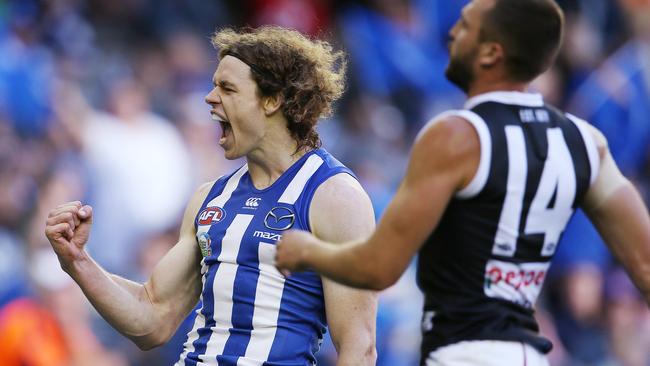
Tasmania
Don't miss out on the headlines from Tasmania. Followed categories will be added to My News.
SURROUNDED by players who are often recruited straight out of high school and plunged into the high-pressure world of AFL football, Tasmanian-born Kangaroos forward Ben Brown, 25, is a bit of an oddball.
Brown was considered a “mature age” pick when he was drafted by North Melbourne in 2013 at the ripe old age of 21. He has an arts degree, majoring in journalism and sociology, his studious nature earning him the nickname “The Professor” while playing for the Tassie Mariners. He refuses to be a player defined by idiosyncrasies or gimmicks; and this two-metre-tall goalkicking machine is a vegan who has proven he can maintain his size and strength on a very strict diet.
He and his wife Hester are expecting a baby around the end of the year, and between his family life and “real world” experience prior to entering the AFL, Brown is one very well-grounded bloke.
“A footy career is only for a short time, it can end at any point,” Brown says. “People talk a lot about what footy players earn – and I’ll be honest, we have nothing to complain about – but even if an injury doesn’t finish it for you, your career might only last until you’re 32, so you have to be smart about it.
“I think it is a trap a lot of people can fall into: that professional sportsperson’s lifestyle. But Hester helps me keep my feet on the ground.
“I grew up in a big family, I’m the eldest of six brothers, so a lot of food had to be put on the table every night, and my parents did a great job of that but there wasn’t much room for lavishness, so I grew up with a stingy side, I think.”
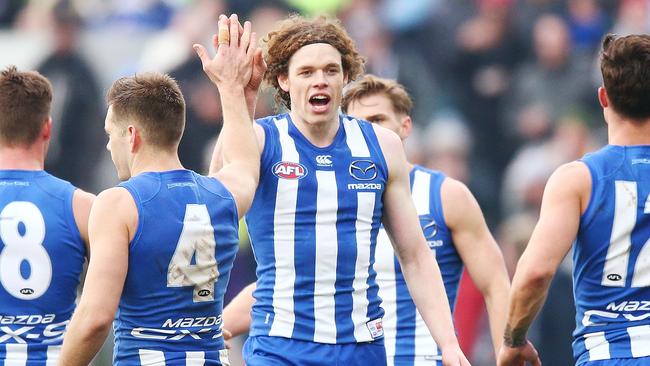
Born in Hobart, Brown moved to Devonport at the age of three where his father, an industrial chemist, worked at the Wesley Vale pulp mill. Brown and his brothers were born into a sports mad family, and they followed suit.
His uncle is former Collingwood premiership player James Manson and his grandfather, “Gentleman” Jim Manson played more than 200 games for the Glenorchy Football Club. Both men played forward and ruck, just as Brown does today.
Naturally, sport was a big part of life growing up and Brown played tennis, basketball and cricket as well as junior football for the Devonport Football Club, keeping his parents pretty busy between him and his brothers. But, as his father holds a PhD and his mother is a teacher, academia was also emphasised at home.
“It was drilled into us from a very young age that the academic side was very important,” he says. “Mum and dad drove from one end of the North-West Coast to the other every week taking us to our various sports, it was pretty full on for everyone. But as well as making sure we had the opportunity to play sport as kids, in the background there was always a high value put on studying, doing all our homework, always getting assignments in on time and so on.
“Footy as a career never really crossed my mind as a kid. I always thought of it as being a long way off. And I was always a really stringy kid, not much meat on my bones, so I wasn’t sure I was even a good fit.”
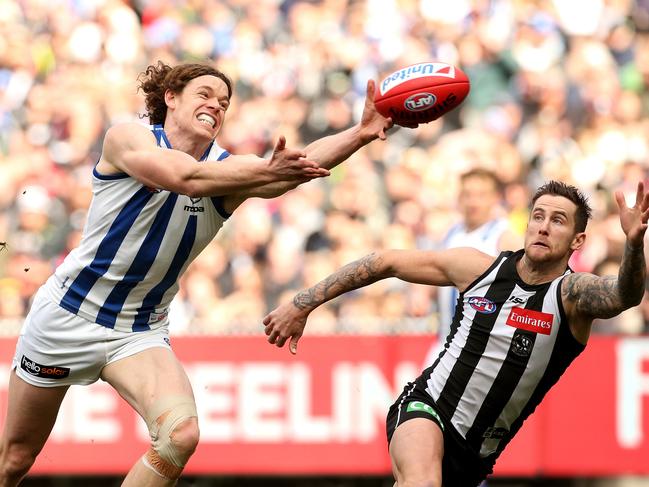
That pipedream started to edge closer to becoming reality when Brown started playing for the Tassie Mariners when he was in Year 12, representing Tasmania in the national under-18 championships in 2010.
Despite showing early promise as a ruck and forward with the Mariners, Brown was hampered by an anterior cruciate ligament injury and later a groin injury while with the club. While he was passed over by AFL recruiters when playing for the Mariners, Brown was starting to get a sense of being on the big league’s radar.
“While in the under-18s I still played a few good games, and then I started hearing my name being bandied around in some draft discussions. That was exciting but it was all pretty new to me and I just took it in my stride. In any case, it was all cut down by my injuries.”
Following the closure of the Wesley Vale pulp mill, Brown’s parents relocated to Hobart where his dad took a job with the Boyer newsprint mill and his mum started teaching at Sacred Heart College, in New Town.
In 2011, Brown began his combined Bachelor of Arts/Law degree at the University of Tasmania in Hobart, and in that same year he started playing for the Glenorchy Magpies in the Tasmanian State League, again playing mainly in ruck and occasionally up forward.
Then-Glenorchy coach Ben Beams said it was clear even then that Brown had significant potential.
“At that stage he had been overlooked a couple of times in the draft and he was still pretty raw but he has always had the attitude to succeed. I could definitely see he had the attributes to be a star player. We mainly played him in the ruck, occasionally forward, he wasn’t overly quick but he had a big engine, heaps of stamina,” Beams says.
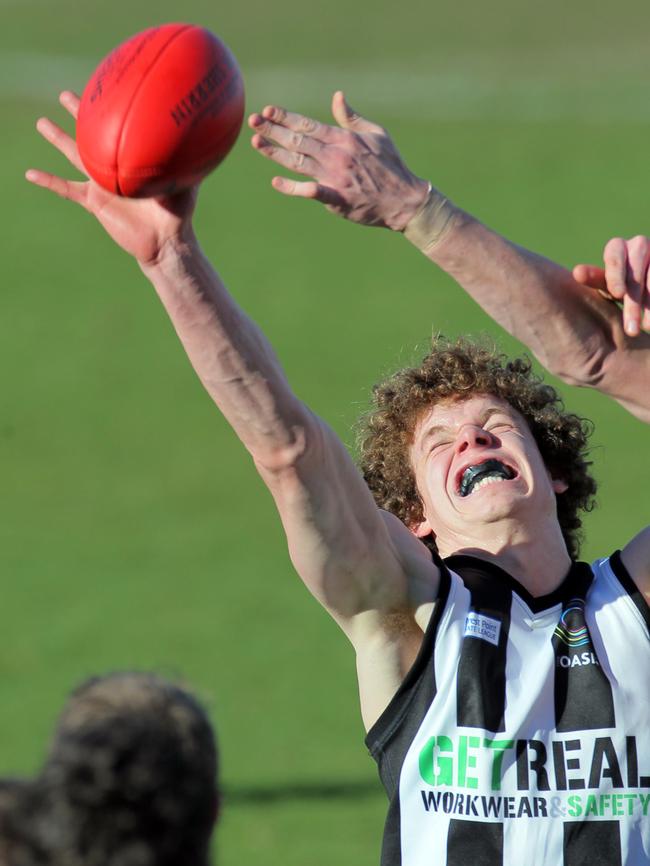
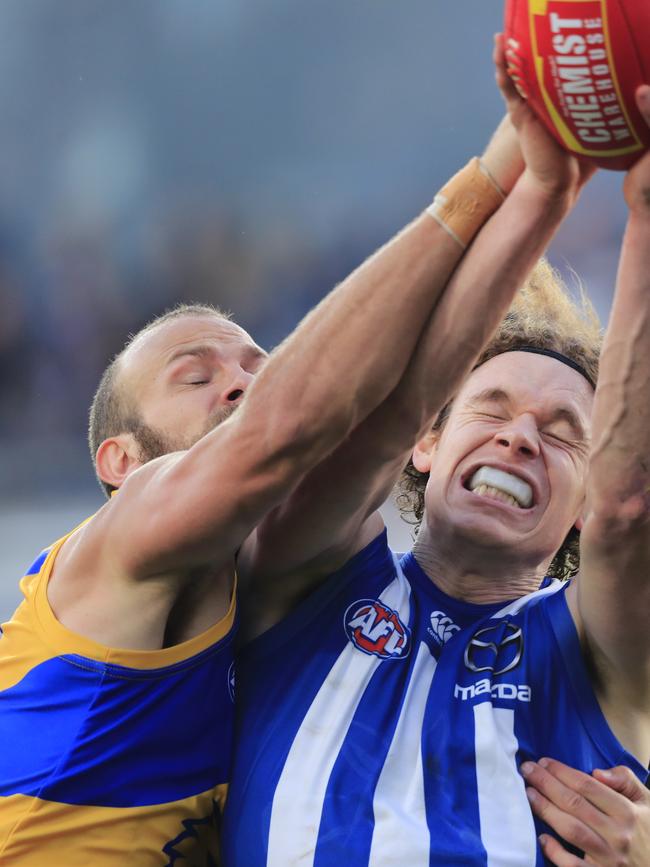
Meanwhile, Brown decided pretty quickly that law was not where his interests lay, so he switched to a straight Arts degree, majoring in journalism and sociology instead, remaining dedicated to his studies while simultaneously striving to be recruited by the AFL.
“Even when you’re aiming to play footy for a living, you need to have a backup plan, you need something to fall back on when you retire from the game, and I think I learnt some great skills in that degree. But I didn’t really see uni as my backup plan then, because footy was still something off in the distance. Uni was actually my first plan.”
“My wife also did an Arts/Law degree, so I have a great deal of pride in what she was able to do. I know how intense it is to study law. I really enjoyed the English side of my degree and I saw maybe a career path in that as well, particularly sports journalism, writing about sport would be a great way to still be involved even if I couldn’t play.”
He started putting some of these skills to use while with the Glenorchy Football Club, working one day a week maintaining and improving the club’s website.
“Some of the stuff I wrote is still there. I used to do the stats for the weekend games as well as go over footage of the games and list the kicks, goals, disposals and so forth on the website for the guys to go over at the end of the day.”
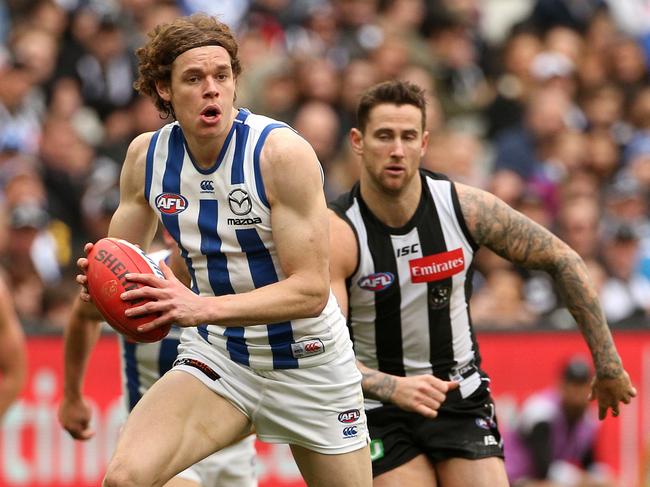
Things were picking up on the field as well, and after a good season in the TSL he moved to Melbourne in 2013 to play for VFL side Werribee – alongside other eventual AFL stars like Mason Cox and Majak Daw – which would not only place him more squarely on the radar for AFL recruiters, but allowed him to spend more time playing in forward positions, rather than the ruck, where he always found himself in Tasmania.
“I played ruck in maybe 80 per cent of my games before moving to Werribee, and I didn’t expect to make it as a ruck because I wasn't tall or solid enough. If I was going to be drafted, it would be as a forward, so Werribee gave me the chance to play that position more.”
The gamble paid off and in 2013 he was picked up by the North Melbourne Football Club, kicking a goal in his debut match in the 2014 season, defeating Melbourne in Round 14.
Today he is a valuable key forward for the Kangaroos, known for his accurate goalkicking and strong contested marks, with a career total of more than 200 goals. And this year he is having a great season, having kicked 54 goals in the first 19 rounds of the season. Heading into the 20th round this weekend, Brown sits atop the Coleman Medal leaderboard – four ahead of Sydney’s Lance Franklin. The Coleman Medal is one of the most prestigious awards in the AFL, which honours the player who kicks the most goals in the home-and-away season.
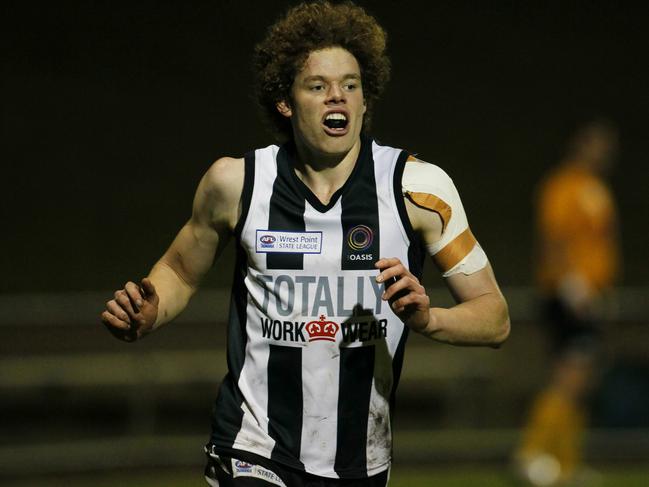
For all his success, Brown remains humble and grounded, and he says he feels sympathy for some of those younger recruits who were not able to get the same life experience under their belts before entering the AFL.
Just 25, he is still a young man himself, but says that even the couple of years of life and study in between finishing Year 12 and being drafted has given him a much more solid emotional base.
“Yeah I do feel a bit sorry for the young kids who are drafted in straight out of school, straight from Year 12. It is really difficult to adjust quickly to the AFL lifestyle with no knowledge of life outside of that AFL bubble,” he says.
“In some ways it is an extension of high school or college life, because it is so regimented and structured, you get a text message every night with your schedule for the next day, telling you where to be at what time.
“So being able to do uni before going to my club was really valuable, I think, and something a lot of kids could get something out of. Some players can end up retired from the game at 32 years old with nothing on their resume except finishing high school and playing footy, which doesn’t give you a lot to rely on to get back into the workforce.
“If I could make the rules I’d probably lift the draft age up a year or two so kids could have a similar experience to me, do something else before going into the league. Even when you’re playing, though, it is possible to study a half-load at uni if you want to, and a lot of the younger players do try to do that. We have personal development managers who help players with continuing their studies, doing work placements and so on. Football isn’t forever, people sometimes forget that. You need to have something to do afterwards.”
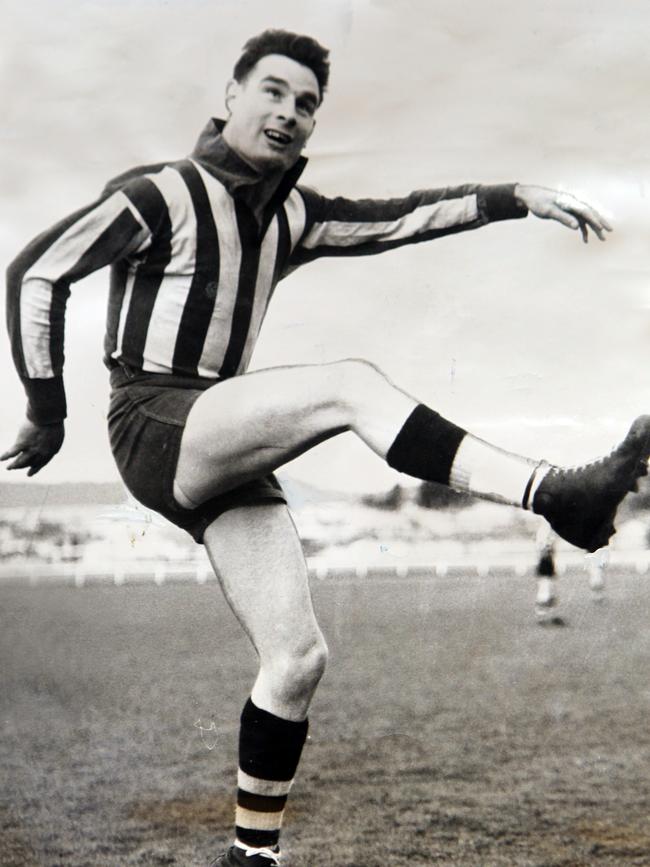
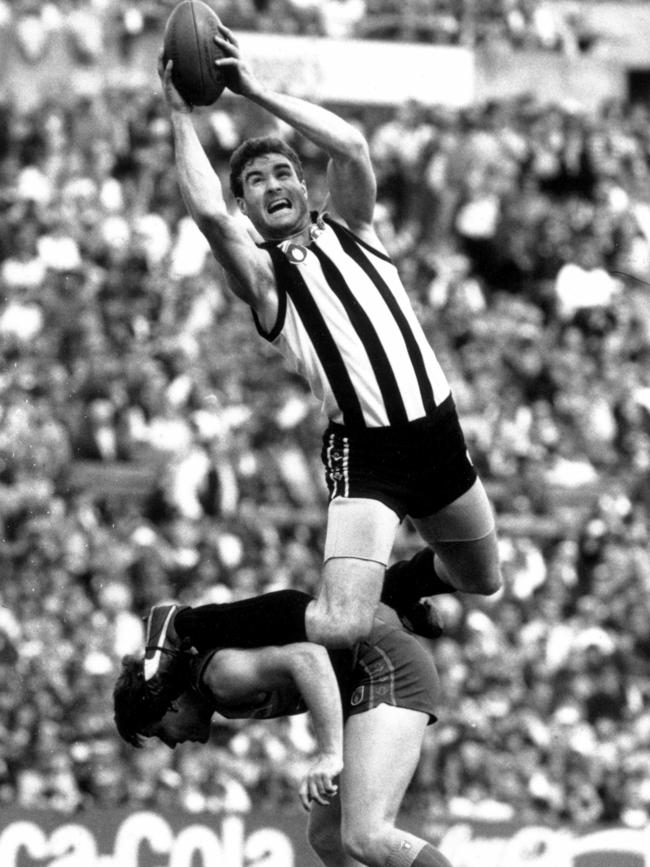
Being the latest generation in a high-achieving Aussie rules family, Brown carries the torch for his uncle and grandfather but says he tries not to think too much about it being a family legacy. And he is strongly averse to being known for his long pre-goal run up, something he wishes did not garner as much attention as it does.
“I dunno, I don’t think it’s that unusual, but people keep saying it is. We get put in boxes as players and I don’t want to be known for just that,” he says.
“Uncle Jim always cops a bad rap for his kicking style, which was considered unusual. In terms of kicking it wasn't great to look at but it was very accurate and he kicked a lot of goals for a guy who mostly played in ruck.
“Yet, with people who loved the team back then, it’s all they ever talk about, forgetting all his amazing contested marks and the raw power he brought to Collingwood.
“I get asked about my run up every week and I’m a bit tired of it. It would be great if people remember lots of different aspects of your game, not just the one thing.”
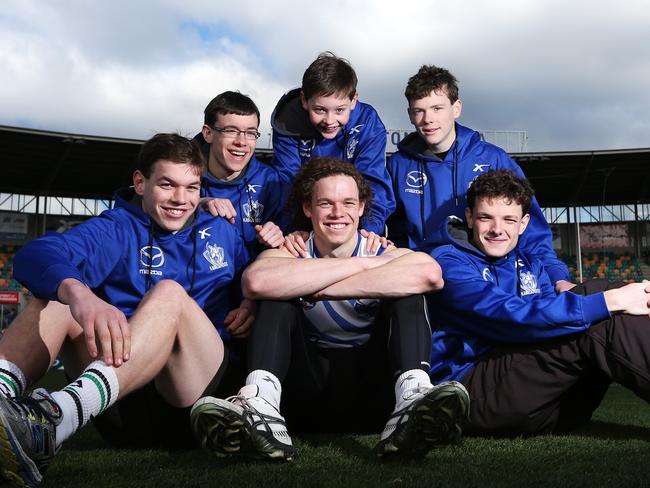
TASSIE’S STAR ROO BEN BROWN SCORES BIG IN LOVE
One thing he doesn’t mind being known for is his veganism. His wife, Hester, who he met in Melbourne and married last year, was vegetarian when they met and has been vegan for the past three years. Brown spent all of last year as a pescetarian (eating fish, dairy and eggs but no red meat or poultry) before finally going full vegan from the start of this year.
“It was an ethical decision for me. I decided if I could get what nutrition I needed without harming animals, then I would do that,” he says. “It’s a personal choice for both of us and neither of us would begrudge anyone for living differently. But it’s a lifestyle choice we were able to make and we’re pleased we did.
“Being pescetarian for a year was sort of easing myself into it, I guess. The club wanted to make sure I did it in stages because they didn’t want to put my health or performance at risk. I needed to be careful about nutrition and make sure I could still get everything I needed to maintain my physical fitness.
“But the club was really supportive and the club dietitian and chef have also been extremely supportive, and it’s going well – I feel great.
“I am coeliac as well, so I have to eat gluten-free, so I was already quite used to being careful about my food and having to cook at home rather than eating out.”
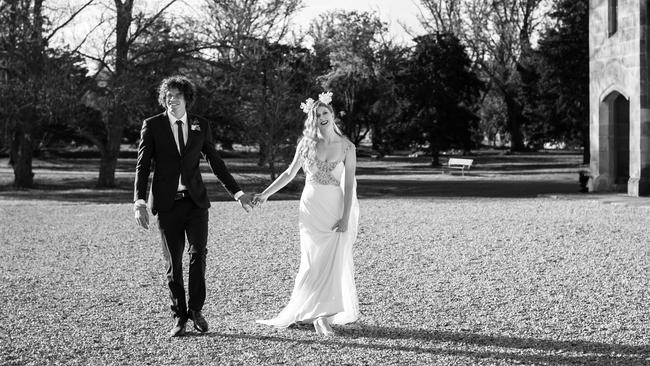
Playing for North Melbourne, with the club’s ties to Hobart’s Blundstone Arena, has given Brown a great way to stay in touch with his home state, and he is still fondly remembered by his former local clubs.
“He always was a great, very coachable young fella,” Beams says. “Well loved by his teammates and just a great teammate for the guys. They all still love seeing what he’s able to do now. I go to see him play as often as I can.
“Even my young guys, my son is eight, he loves watching Ben Brown. He used to be there watching him running around on the field for Glenorchy. Ben is still a huge inspiration for the younger players here.”
Originally published as TasWeekend: Ben Brown putting his best feat forward


